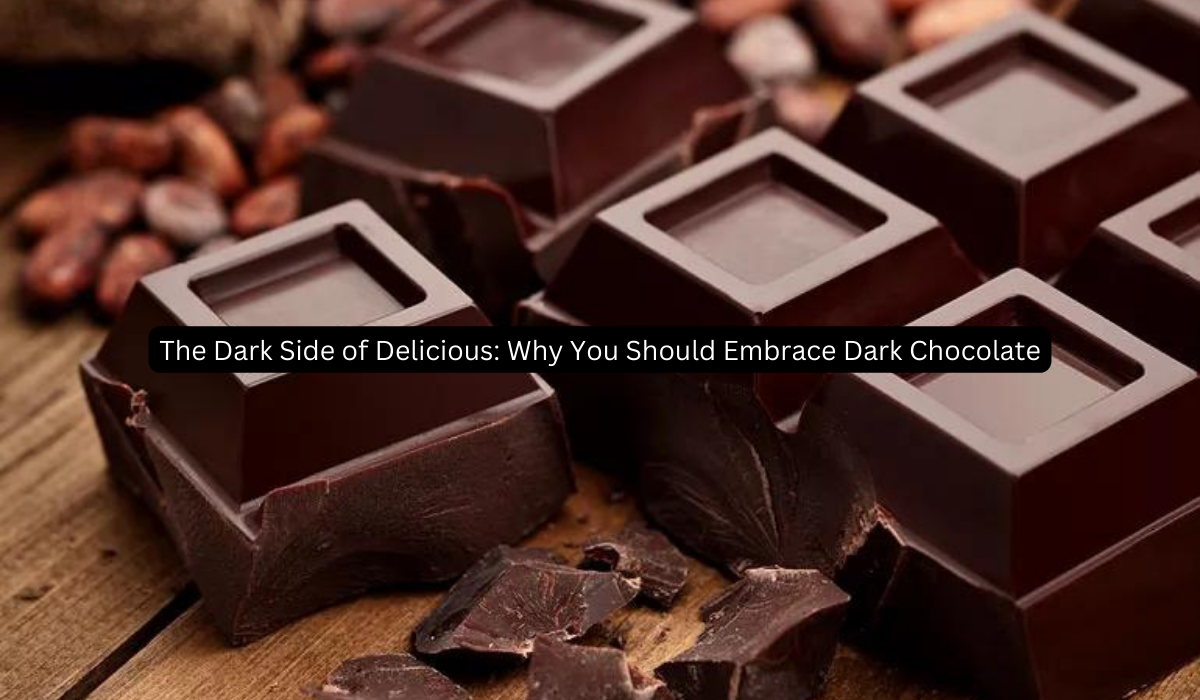Chocolate. The mere mention of the word conjures up images of creamy milk chocolate bars and decadent desserts. But what if we told you there’s a healthier, and some might even say tastier, option lurking in the shadows? Dark chocolate, often seen as the slightly bitter cousin of its milky counterpart, boasts a surprising array of health benefits that make it a worthy addition to your diet. So, ditch the guilt and delve into the world of dark chocolate, where indulgence meets well-being.
Beyond the Sweetness: Unveiling the Benefits of Dark Chocolate
Dark chocolate isn’t just a treat; it’s a treasure trove of nutrients with the potential to positively impact your health. Here’s why you should consider incorporating it into your diet:
- Packed with Antioxidants: Dark chocolate, particularly varieties with a higher cocoa content (70% or above), is rich in antioxidants called flavanols. Imagine them as tiny warriors fighting off free radicals in your body, protecting your cells from damage. These antioxidants may help reduce the risk of chronic diseases like heart disease and cancer.
- Boosts Brain Power: Studies suggest that dark chocolate can improve cognitive function and memory. Think of it as a little brain food! The flavanols in dark chocolate may enhance blood flow to the brain, potentially leading to sharper focus and improved cognitive performance.
- Promotes Heart Health: The flavanols in dark chocolate may help lower blood pressure and improve blood flow. Additionally, dark chocolate may have a beneficial effect on cholesterol levels, potentially reducing the risk of heart disease.
- Improves Mood and Reduces Stress: Dark chocolate contains mood-boosting chemicals like phenylethylamine and anandamide. Think of them as natural stress relievers and happiness enhancers! These chemicals can trigger feelings of pleasure and well-being, potentially reducing stress levels and improving mood.
- Aids in Weight Management: While chocolate might seem like a weight-gain culprit, dark chocolate, in moderation, can actually be beneficial for weight management. The high cocoa content in dark chocolate can promote feelings of fullness and decrease cravings, potentially aiding in weight control efforts.
It’s important to note that most of these benefits are associated with moderate consumption of dark chocolate (around 1-2 ounces per day).
Choosing the Right Bite: Not All Chocolate is Created Equal
Not all chocolate is created equal, and the key to unlocking the health benefits lies in choosing the right kind. Here’s what to keep in mind:
- Cocoa Content is King: The higher the cocoa content, the greater the concentration of flavanols and the associated health benefits. Aim for dark chocolate with at least 70% cocoa content for the best results.
- Beware of Added Sugar: While some sweetness can enhance the flavor, excessive sugar content can negate the health benefits of dark chocolate. Choose varieties with minimal added sugar or natural sweeteners like stevia.
- Milk Chocolate vs. Dark Chocolate: Milk chocolate, while delicious, generally has a lower cocoa content and higher sugar content compared to dark chocolate. For optimal health benefits, stick with dark chocolate.
By understanding these factors, you can make informed choices when selecting dark chocolate to reap its health rewards.
Sweet Indulgence with a Healthy Twist: Enjoying Dark Chocolate
Dark chocolate is a versatile ingredient that can be enjoyed in various ways beyond simply grabbing a bar. Here are some ideas to incorporate it into your diet:
- Savor a Square: Enjoy a small square of dark chocolate after a meal for a satisfying and guilt-free dessert.
- Add it to Trail Mix: For a protein and antioxidant boost, add dark chocolate chips to your homemade trail mix.
- Bake with Dark Chocolate: Elevate your baking by using dark chocolate in cookies, brownies, or even muffins. Remember to adjust sweetness levels since dark chocolate is less sweet than milk chocolate.
- Pair it with Fruit: Create a delicious and healthy snack by pairing dark chocolate with fresh fruits like strawberries, bananas, or oranges.
- Make a Healthy Hot Chocolate: Use dark chocolate instead of cocoa powder to make a healthier and richer hot chocolate beverage.
These are just a few ideas to get you started. With a little creativity, you can easily incorporate dark chocolate into your diet and enjoy its taste and health benefits.
Conclusion
Dark chocolate, when enjoyed in moderation, can be a delicious and beneficial addition to your diet. It’s packed with essential nutrients and antioxidants that contribute to a healthy heart, brain, and overall well-being. So next time you’re looking for a satisfying treat with a health bonus, reach for a square of dark chocolate and indulge guilt-free!
Frequently Asked Questions
1. Isn’t dark chocolate still high in calories and fat?
Dark chocolate does contain calories and fat. However, compared to milk chocolate, dark chocolate (especially varieties with 70% cocoa content or higher) has a lower sugar content and a higher percentage of healthy fats. Additionally, the high cocoa content in dark chocolate can promote feelings of fullness, potentially helping you manage your overall calorie intake. Remember, moderation is key. Enjoying a small amount of dark chocolate as part of a balanced diet can offer health benefits without derailing your dietary goals.
2. I don’t like the bitterness of dark chocolate. Are there any options for me?
If you find dark chocolate too bitter, there are a few ways to ease into it:
- Start with a lower cocoa content (around 50-60%) and gradually increase it as your taste buds adjust.
- Look for dark chocolate with added ingredients like nuts, fruits, or caramel for a touch of sweetness without compromising on the health benefits.
- Pair your dark chocolate with fruits like strawberries or bananas. The sweetness of the fruit can help balance the bitterness of the chocolate.
3. Can I cook with dark chocolate instead of baking chocolate?
Yes, you can definitely cook with dark chocolate instead of baking chocolate. However, keep in mind that baking chocolate usually has a specific cocoa content (around 55-70%) formulated for baking purposes. Using dark chocolate with a higher cocoa content might alter the flavor or texture of your baked goods slightly. It’s recommended to experiment and adjust your recipe accordingly to achieve the desired outcome.
4. Are there any downsides to eating dark chocolate?
While dark chocolate offers numerous benefits, there are a few things to consider:
- Caffeine Content: Dark chocolate does contain a small amount of caffeine. If you’re sensitive to caffeine, be mindful of your intake and avoid consuming dark chocolate too close to bedtime.
- Migraines: Some people with migraines report that chocolate can be a trigger. If you experience migraines, it’s best to monitor your intake and see if dark chocolate affects you.
- Allergies: People with allergies to milk or soy should be cautious and check the ingredients list of dark chocolate before consuming it, as some varieties may contain milk solids or soy lecithin.
5. How can I store dark chocolate for optimal freshness?
Store your dark chocolate in a cool, dry place away from direct sunlight and heat. An ideal temperature range is between 60-68°F (15-20°C). You can also store dark chocolate in an airtight container in the refrigerator for longer shelf life. Just be sure to let it come to room temperature before consuming to avoid a waxy texture.

